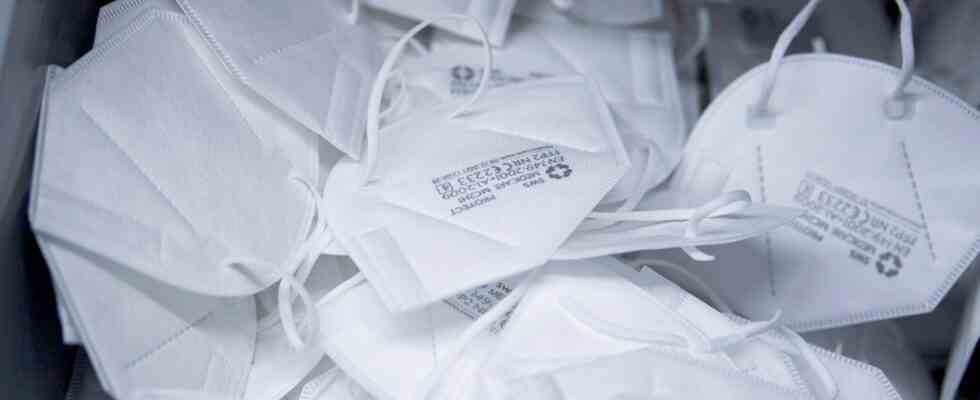Status: 03.02.2023 1:16 p.m
A study by the Cochrane research network is said to prove that masks are of little or no use in the fight against the corona virus. But the paper does not allow such a conclusion.
The benefit of mouth and nose protection against the spread of the coronavirus has long been the subject of heated debate. Almost simultaneously with the abolition of the mask requirement on buses and trains, an overview study by the renowned research network Cochrane is now causing explosives.
Mask opponents are happy because they see their arguments scientifically confirmed by the study. That’s what they say Cochrane study prove that masks offer little or no protection against infection with the corona virus.
The relevant Telegram channels go even further. The measures to contain the pandemic actually had completely different reasons. “Now it’s official… mask duty… it was never about health, it was about control and submission.” The right-wing extremist magazine “Compact” writes of a “lousy game” in politics.
Conclusion not allowed
In doing so, Cochrane Germany tries through a opinion to take direct action against “overly far-reaching interpretations” in social media. The conclusion that the results of the study prove that masks are of little or no use in the fight against Corona is not permissible. Because: “Most of the studies are older and relate to the transmission of influenza and other cold viruses, studies from the corona pandemic remain in the minority.”
In the Cochrane paper, the authors examined a total of 78 studies, including works on the influenza virus, the Covid pathogen Sars-CoV-2 and severe acute respiratory syndrome (Sars). The majority of the surveys examine classic peak seasons for respiratory viruses up to 2016, not the corona pandemic.
variety of measures examined
The study results refer to the effectiveness of all non-pharmacological measures – i.e. not only to masks, but also to hygiene, isolation or distance rules. “Only three additional studies were added to the nine studies in the last version (November 2020) on the benefits of face masks,” Cochrane writes in the statement.
Authors of the study admit “research gaps”.
Nevertheless, the authors write that wearing masks in the population is likely to have little or no impact on the occurrence of diseases such as flu and corona.
However, they also limit the significance of the results. ‘The high risk of bias, the differences in how outcomes are measured and the relatively low level of compliance during the study periods make it difficult to draw firm conclusions,’ they point out.
How well masks actually protect against the corona virus urgently needs to be further investigated. The authors speak of “research gaps”.
Lots of restrictions
Cochrane Germany also explains: When interpreting the results, possible “limitations and sources of error in the underlying studies” should also be considered. These could include deficiencies in the study design or the “insufficient validity of some studies because they were carried out during times when the virus circulation was low”.
In the studies on masks, the “difficult to check and probably often low adherence to mask wearing, i.e. the question of whether the study participants really wore their masks regularly and correctly,” should be taken into account.
Expert: study “little meaningful”
“The Cochrane study is not very meaningful,” explains Eberhard Bodenschatz, Professor of Physics and Director at the Max Planck Institute for Dynamics and Self-Organization in Göttingen. A major problem with the study is that it brings together various respiratory diseases such as corona and normal flu. “Our studies have clearly shown that masks are physically wonderful protection,” he told the dpa news agency. They improved protection against infection by a factor of at least ten to a hundred. The various individual studies are not comparable.
Bodenschatz also criticized the authors: “In one sentence they write that masks don’t work, and a paragraph later they admit that they can’t actually say it.” This type of communication is unfortunate.
Investigation shows minority opinion
Mathias Pletz, head of the Institute for Infectious Diseases and Hospital Hygiene at Jena University Hospital, is also critical of the study. “There are some other meta-studies that come to the opposite conclusion,” for example in the specialist journals Frontiers in Public Health or The BMJhe said tagesschau.de. The current Cochrane study is a minority opinion in the research community. “There is very good evidence from hospitals, for example, that masks protect against infections there.” The problem is that people do not wear masks consistently, especially in their private lives.
There is a lot of evidence that masks protect very well against infections. One is that there were almost no influenza and RSV cases during the pandemic because masks were compulsory most of the time. However, the lead author of the Cochrane study is known to be very critical of certain protective measures. “He never made a secret of his rejection of the masks,” said Pletz. The result is therefore not surprising.
Other studies show effectiveness
According to Bodenschatz, various scientific analyzes have long shown that masks protect against infection with the corona virus. An overview study from mid-2020, which was published in the renowned journal “The Lancet”, shows that protective masks can significantly reduce the risk of infection.
From an end of 2021 in the journal “PNAS” A published study, in which Bodenschatz was significantly involved, shows that masks can significantly reduce the risk of infection: If a non-infected and an infected person wear well-fitting FFP2 masks, the maximum risk of infection after 20 minutes is even at the shortest distance in in a room hardly more than one per thousand.


